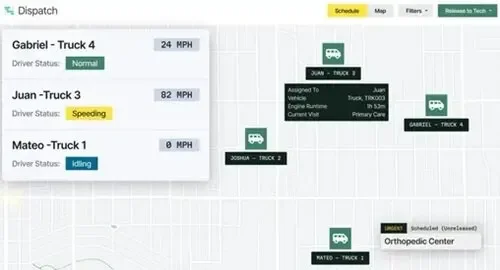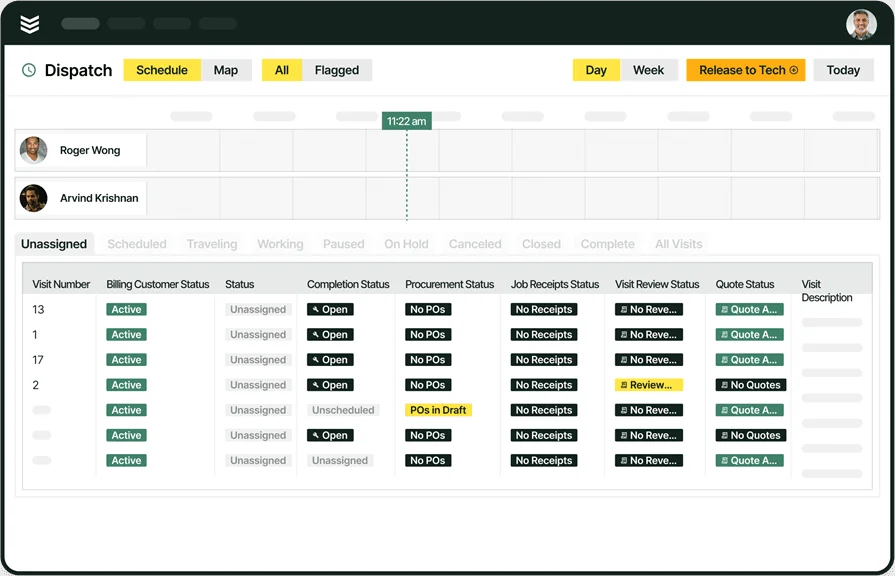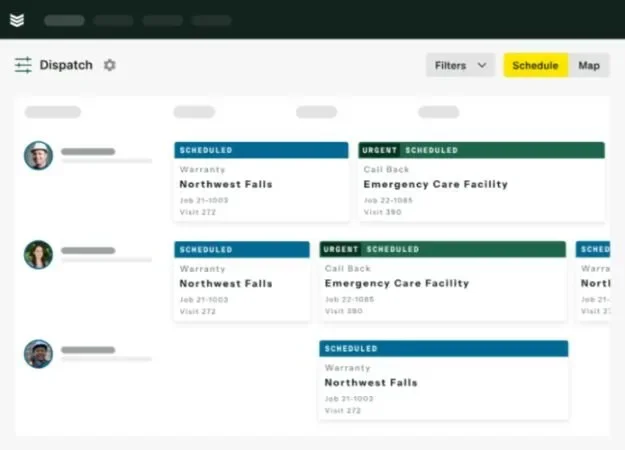Fleet dispatching runs deeper than assigning jobs and sending trucks out the door. It’s about keeping techs, vehicles, and timelines aligned—especially when the day throws curveballs. That’s where strong fleet dispatch software steps in.
With real-time tracking, job updates, and vehicle coordination, these systems help dispatchers make fast, accurate calls. Whether you're handling HVAC emergencies, plumbing installations, or routine maintenance across service zones, every moving part needs to stay in sync.
Dispatching is a core piece of field service management. When dispatch flows well, crews stay productive, customers get timely updates, and jobs wrap faster. Choosing a system that fits your workflow is where it all starts. In this guide, we’ll cover:
- How to choose the best fleet dispatch software for your operation
- 5 key features to look for in fleet dispatching software
- Best fleet dispatch software for commercial contractors
- Best dispatch fleet management software for residential contractors
- Best dispatch fleet management software for general contractors
- Other notable dispatch fleet management systems to choose from
- 7 benefits of switching to a modern fleet dispatching system
- 4 important FAQs about fleet dispatch software
Not every system will match how your team works. Before diving into features, it’s worth understanding what makes a fleet dispatch system actually fit your day-to-day. That’s where we’ll start.
How to choose the best fleet dispatch software for your operation
For field service contractors, effective fleet dispatch software must accommodate urgent calls, maintenance, and crew movement by mirroring their actual workflow on the dispatch board. Before locking in a platform, ask yourself the questions that reveal what matters most. The answers will help you decide whether a dispatch fleet management system supports your daily workflow—or adds friction that slows everyone down.
- Crew setup and job flow - Are your dispatchers and field techs working off the same platform? Does the software support quick job turnarounds for emergency plumbing calls? Can your team update work orders and job notes from the field without phoning into the office?
- Real-time communication and field updates - Can dispatchers and techs stay connected during busy service hours? Are plumbers able to receive updates instantly, even when they’re mid-route? Does the fleet dispatching software push alerts to customers automatically when a tech is on the way?
- Tool syncing and operational visibility - Does the system plug into your estimating, payroll, and parts inventory tools? Can it give you a real-time view of job status, vehicle location, and technician hours from one screen? Does the dispatch fleet management software let your back office track trends without exporting spreadsheets?
- Scalability and flexibility - Can the software grow with your operation as your service area expands? Is pricing transparent as your vehicle count increases? Will your fleet manager dispatch software stay efficient even as job volume spikes?
- Features - Does it support drag-and-drop scheduling, GPS-enabled routing, and live job tracking? Can you assign jobs based on availability, zone, or tech specialty? Does the platform make it easy to reassign calls when things change fast?
Once you’ve mapped out how your fleet actually moves and what your system needs to keep up, it’s time to dig into the features that drive performance. Next up, we’ll walk through the core tools your fleet dispatch system should have—starting with the essentials.
5 key features to look for in fleet dispatching software
The best fleet dispatch software doesn’t just keep the board full—it keeps the day running clean. For service contractors juggling urgent calls, reschedules, and customer follow-ups, every minute counts. A dependable dispatch fleet management system connects all the moving parts—techs, trucks, timelines, and tools—so your team isn’t chasing its tail when the pressure’s on.
Below are the five key features that actually make a difference in the field—plus real situations where each one pulls serious weight.
1. Real-time scheduling and job dispatching
No feature impacts dispatch like scheduling. Your fleet dispatching software should give dispatchers full visibility—who’s available, what jobs are in progress, and how long each one will take. With real-time scheduling software baked in, jobs move fast and your techs aren’t left guessing.
Let’s say you’ve got a last-minute emergency at a restaurant—major leak, water everywhere. Instead of scrambling, your dispatcher checks the live board, finds a nearby crew wrapping up early, and sends them over immediately. Job assigned, route updated, no wasted motion.

Get jobs done quicker
Send the right technician to the jobsite every time—with less back-and-forth.
2. Field-ready mobile access for techs
The moment techs hit the road, your dispatch fleet management software needs to shift to mobile mode. Field crews should be able to pull up job details, log notes, and capture signatures—all without looping in the office. A well-built mobile field service technician app keeps everything flowing from the field.
For example, during a morning install, a tech notices signs of a previous repair that isn’t documented. Instead of halting the job, they snap a photo, leave a note, and mark it for follow-up—all on-site, in minutes. Office sees it in real time. Nothing gets missed, and your team doesn’t have to circle back later.
3. Integrated quoting tied to dispatch flow
When quoting tools and dispatch are separate, the gaps create headaches—lost approvals, misaligned expectations, and slower job starts. A connected fleet manager dispatch software setup should streamline the quote-to-job pipeline. With quoting software, approved work feeds straight into the dispatch queue, no duplicate entry.
Picture a tech in the field inspecting a water heater. They flag a replacement, build a quote on the spot, and the customer gives the green light. While the tech’s still on-site, that approved quote becomes a scheduled job—ready for tomorrow’s route. Less admin, faster turnaround, cleaner ops.
4. Centralized job, customer, and asset tracking
A strong dispatch fleet management system should do more than show job status. It needs to connect all the dots—customer history, site notes, equipment details, and ongoing agreements. With the right CRM software in play, dispatchers and techs stay fully informed without digging through emails or shared drives. Now picture a dispatcher taking a call from a returning customer. Within seconds, they can view the full history—past repairs, equipment on site, and open service agreements. No guessing, no repeats, just confident scheduling that makes your company look buttoned up.
5. Invoicing and payment automation
Once the job is done, the last thing your team needs is a pile of paperwork. The best fleet dispatch system connects your invoicing and payment tools so you can bill fast and get paid even faster. Field teams log completion, and the platform—like automated invoicing and payment software with integrated payment processing—takes care of the rest. Say a tech wraps up a sump pump install. They mark the job complete in the field, and the invoice lands in the customer’s inbox before the van even pulls away. Customer taps to pay, and the funds hit your account within hours.
Other notable fleet dispatch software features
Even with a reliable fleet dispatch software setup in place, there are extra tools that can lighten the load for your back office. These features aren’t required to get jobs on the board or techs out the door—but they do boost clarity, reduce repeat work, and keep your entire dispatch fleet management system running smoother behind the scenes.
For contractors managing high volumes, service agreements, or fast-paced quoting, the extras below are worth a look.
- Service agreement tracking – Managing recurring visits or long-term contracts is simpler when the system keeps tabs on task lists, contract terms, and visit dates automatically. With automated service agreement tools, dispatchers no longer have to send manual reminders or guess when it's time to return. Techs know exactly where to go and when, helping your team lock in repeat business without overthinking it.
- Reporting and job analytics – Knowing how your operation performs shouldn’t require spreadsheets. A strong dispatch fleet management software should provide built-in reporting tools for field service—letting you track metrics like completion time, route efficiency, and tech productivity. These insights help managers pinpoint bottlenecks and tighten up scheduling without second-guessing.
- Pipeline and job approval flow – Keeping your dispatch board aligned with approved quotes and work orders makes a huge difference. With pipeline management tools, your fleet manager dispatch software can show which jobs are quoted, approved, and scheduled—all in one view. That means less toggling between tabs and fewer delays getting jobs assigned.
While the features above shape how well your system runs, the software itself still needs to match the scale and demands of your business. For commercial contractors handling high-volume service calls, multi-site clients, and large fleets, not every platform can keep up. Let’s break down which dispatch fleet management software actually delivers when the jobs get bigger and the stakes get higher.
Best fleet dispatch software for commercial contractors: BuildOps
BuildOps gives commercial contractors the fleet-level visibility needed to run large-scale field operations. For teams managing dozens of trucks, techs, and job sites, it offers real-time fleet tracking combined with a live dispatch board, so every vehicle and crew is accounted for. Dispatchers can assign jobs by location, adjust routes on the fly, and monitor field progress as it happens—keeping tight control over job flow and travel time. With drag-and-drop scheduling, customer property tracking, and GPS-integrated updates, BuildOps turns your back office into a fleet command center.
How pricing works: BuildOps provides live weekly demos and tailored walkthroughs to explore tools that match your operations.
Features beyond dispatching: Fleet tracking, quoting, project management, invoicing, and digital job documentation.
What sets it apart for commercial contractors: BuildOps connects complex job schedules with fleet logistics—making it easy to dispatch based on proximity, service priority, and real-time vehicle status.

Stay on top of your mobile workforce
We help field service pros get full control over trucks, routes, and teams in motion.
Best dispatch fleet management software for residential contractors: Workiz
Image Source: Workiz
Workiz helps small to mid-sized residential contractors manage both dispatching and fleet activity from a single platform. The system includes real-time vehicle tracking, two-way tech communication, and drag-and-drop job assignment—all suited for teams looking to simplify their routing and stay in touch with techs on the road. It’s a clean option for shops that want visibility without complexity. However, it may not be ideal for larger contractors who need deeper fleet insights or tighter integration with more advanced fleet tools.
How pricing works: Plans start at $187/month for one to five users, with custom pricing for additional features.
Features beyond dispatching: VoIP phone system, online customer portal, payment tools, and in-app communication.
What sets it apart for residential contractors: Workiz keeps things lean with a lightweight interface that makes tech tracking and dispatch quick and straightforward.
Best dispatch fleet management software for general contractors: ScienceSoft
Image Source: ScienceSoft
ScienceSoft offers a deeply customizable solution designed for general contractors managing mixed job types, vehicle fleets, and multi-phase project workflows. With real-time driver tracking, route planning, and task coordination, the platform supports end-to-end fleet oversight across complex operations. Dispatchers can route jobs based on technician skills, vehicle status, or custom rules—and integrate everything with broader ERP or CRM systems. That said, the configuration depth may be more than needed for smaller teams or those looking for faster setup.
How pricing works: Fully customized based on team size, use case, and scope—offered through consultation and project planning.
Features beyond dispatching: Asset monitoring, route optimization, digital forms, time tracking, and driver visibility.
What sets it apart for general contractors: ScienceSoft enables full control over fleet scheduling logic, job approvals, and technician movement—ideal for companies needing flexibility across diverse job types.
Other notable dispatch fleet management systems to choose from
Some contractors need speed over complexity. Whether you're managing a small crew or looking to add flexibility to an existing workflow, these fleet dispatch system platforms offer dependable tools for tech tracking, job visibility, and vehicle oversight. They may not offer full-scale customization like enterprise systems, but they get the job done without the bloat—especially for growing field service teams.
Simply Fleet
Simply Fleet gives field service businesses an easy way to manage fleet health, vehicle movement, and fuel usage from a centralized mobile dashboard. It tracks service schedules, logs trip activity, and alerts dispatchers to issues before they become roadblocks. It’s a practical option for smaller teams looking to maintain uptime and reduce vehicle-related delays. However, it may not support advanced job routing or deeper technician coordination.
How pricing works: Free plan available with paid tiers starting at $10/user/month based on features and team size.
Features beyond dispatching: Fuel logging, maintenance tracking, driver behavior analytics, and inspection reports.
What sets it apart: Simply Fleet is a fast-launch solution for shops that want to manage their fleet without diving into complex setup or integrations.
Fleetio
Fleetio offers a complete fleet operations platform that supports asset tracking, preventative maintenance, and driver inspection tools. It’s designed for contractors managing mid-size fleets and looking to track every vehicle, part, and service event without losing visibility. Though strong on vehicle data, contractors may still need to pair it with dispatching software to fully connect job flow with fleet location.
How pricing works: Plans start at $4/user/month with add-ons for GPS tracking and advanced integrations.
Features beyond dispatching: VIN decoding, parts inventory management, maintenance workflow, and telematics integration.
What sets it apart: Fleetio is built to reduce fleet downtime and give managers a clean view into vehicle history, repairs, and day-to-day movement.
WorkWave Service
WorkWave Service supports contractors in HVAC, plumbing, and electrical fields with routing tools and dispatch automation designed to reduce drive time and manage daily job loads. It includes customer-facing tools like booking portals and status alerts, making it easier to deliver a connected service experience. That said, users wanting more customization around fleet workflows or advanced reporting may find it limiting.
How pricing works: Custom pricing based on business type, feature needs, and tech count.
Features beyond dispatching: Route optimization, service reminders, customer self-service, and billing automation.
What sets it apart: WorkWave simplifies daily scheduling and route planning while adding a polished customer communication layer.
FieldEdge
FieldEdge brings together service dispatch, fleet scheduling, and real-time status updates on one platform. It’s especially strong in HVAC workflows, helping contractors assign jobs based on skillset, proximity, and available truck time. While it includes robust technician tracking, it may lean too heavily toward HVAC-specific features for companies outside that vertical.
How pricing works: Custom quotes based on company size and software bundle.
Features beyond dispatching: Service agreement management, maintenance tracking, and customer performance dashboards.
What sets it apart: FieldEdge balances dispatching and fleet visibility with a focus on HVAC needs and clean job tracking.
ServicePower
ServicePower delivers a heavy-duty platform tailored for large, multi-region field service teams. It enables dispatch automation, contractor network management, and AI-driven scheduling logic—ideal for high-volume operations. Because of its size and depth, the system may be overkill for smaller or fast-moving teams that need faster onboarding.
How pricing works: Enterprise-level pricing through quote-based consultation.
Features beyond dispatching: Mobile workforce support, warranty processing, and job allocation via AI-based optimization.
What sets it apart: ServicePower is designed to handle nationwide field operations with high dispatch volume and a large technician base.

Compare fleet dispatch providers
Easily compare solutions at a glance so you can find the optimal fit.
7 benefits of switching to a modern fleet dispatching system
Switching from outdated tools or manual scheduling to a modern fleet dispatch system isn’t just about convenience—it’s about giving your business room to grow, react faster, and operate with tighter control. From the back office to the field, these systems cut waste, sharpen visibility, and make dispatching feel less like firefighting and more like strategy.
1. Faster job response without the scramble
Modern systems help dispatchers spot availability, route techs based on proximity, and adjust schedules instantly when the day shifts. That means less downtime between calls and quicker responses to last-minute jobs. With smarter field service routing, teams avoid backtracking and cut drive time without relying on guesswork.
2. Less phone tag between the field and the office
When your system updates job status, vehicle location, and tech check-ins in real time, there’s no need for back-and-forth calls just to stay on the same page. Dispatchers and techs both gain visibility without distractions. In setups built around field technician dispatch software, techs stay informed and productive from the moment they hit the road.
3. Stronger visibility into field performance
Fleet dispatch tools track more than jobs—they track how your team moves, where time gets lost, and how vehicles are used throughout the day. With reporting tools connected across schedules, assignments, and job status, you can identify problem areas before they slow you down. That kind of clarity is what powers good field service reporting without digging through spreadsheets.
4. Smarter scheduling with fewer conflicts
Overbooked routes, techs stuck across town, or time windows slipping—those problems shrink fast when your scheduling tools speak the same language as your dispatch board. Contractors with combined scheduling and dispatching systems get a clear look at job flow and fleet availability in real time, reducing overlap and delays.
5. Centralized data that drives better planning
Every job your team completes adds to a bigger picture. When your system captures job timing, routing decisions, vehicle use, and completion rates, it opens the door to smarter planning long-term. Contractors who use structured field service dashboards get an edge—spotting trends, tracking productivity, and identifying where field performance can improve.
6. More consistent customer experiences
Delayed arrivals and missed updates hurt customer confidence. A modern fleet dispatching software setup gives teams the tools to automate alerts, provide real-time ETAs, and deliver clear communication from quote to arrival. Resources like contractor dispatch management show how these tools directly shape customer expectations and repeat business.
7. Less chaos as your team grows
As your vehicle count and job volume rise, old systems break under the weight. Modern tools scale with your fleet—keeping techs, routes, and job timelines organized without extra work. For service contractors growing their footprint or expanding territory, this becomes less of a bonus and more of a requirement.
4 important FAQs about fleet dispatch software
Contractors thinking about switching to fleet dispatch software often hit the same sticking points. If you're dealing with slow systems, scattered job info, or vehicles that aren’t tracked in real time, it makes sense to ask what this software actually changes—and how hard it is to get started.
Below are the four most common questions field service pros ask before making the leap.
1. What is fleet dispatch software?
Fleet dispatch software helps field service businesses coordinate vehicles, assign jobs, and track techs in real time. It gives dispatchers live access to fleet location, job progress, and crew status—all in one platform. The whole operation runs from a single screen with updates as they happen.
2. How does fleet dispatch software work?
It connects your vehicles, field techs, and office staff through one integrated system. Here’s what that looks like:
- Dispatchers assign jobs based on GPS, traffic, and availability
- Techs receive job details on their mobile device while en route
- Vehicles are tracked in real time and rerouted as needed
- Office staff monitor status and send updates to customers
This software solution moves beyond outdated manual processes and estimations by providing real-time visibility into all aspects of your fleet operations. By capturing and displaying live data, it eliminates the need for physical check-ins and reduces reliance on assumptions.
3. Who should use fleet dispatch software?
Any business managing a fleet of service vehicles benefits from a system like this—especially in industries like HVAC, plumbing, electrical, or facilities management. Once your team grows beyond a few trucks, coordinating by phone or whiteboard slows everything down. Fleet dispatch tools help:
- Reduce missed appointments and scheduling gaps
- Keep techs accountable on the road
- Improve how fast and accurately jobs get assigned
Optimizing logistics and communication through specialized software provides real-time tracking, efficient scheduling, automated updates, and comprehensive reporting. This centralization enhances efficiency, response times, minimizes downtime, and improves customer service via unified resource and workload management.
4. How do you roll out fleet dispatch software successfully?
Adopting new systems doesn’t need to stop work. The key is starting with what matters:
- Identify weak spots in your current scheduling and fleet tracking process
- Choose a platform that supports real-time data and field-ready mobile access
- Train dispatchers and techs with short sessions focused on core use
- Integrate the platform with tools you already use—quoting, invoicing, CRM, etc.
- Launch in phases if needed—start with dispatch and build out from there
- Set alerts, automate updates, and keep your crews in the loop
- Track usage early and adjust based on real feedback from the field
When the platform fits how your crews actually move, the payoff shows up fast—fewer delays, tighter routing, and a dispatch board that finally keeps pace.
Managing a fleet takes more than assigning jobs and hoping crews stay on track. You need visibility, control, and a system that moves as fast as the day demands. Whether you're dispatching five trucks or fifty, the goal stays the same—keep the work flowing and the guesswork out.
Fleet dispatch software helps you do that by connecting the office to the road, turning live data into real-time decisions. For commercial contractors juggling complex timelines and multiple crews, an all-in-one setup like BuildOps helps bring everything—from quoting to routing to job closeout—into one streamlined system.

Dispatch faster and cleaner
Make sure your field techs arrive at the jobsite prepared and on time.








